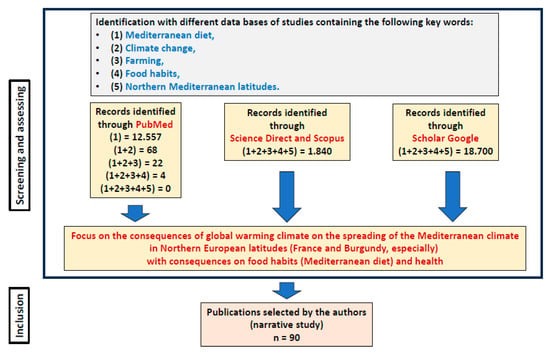The early history of the earth includes the succession of cooling and warming periods with major changes for life: the disappearance, survival, and evolution of plant and animal species [1,2]. For the last 1000 years, in the temperate latitudes of Western Europe, there have been cyclic changes of 150–200-year periods, and the last one started around 100 years ago. Based on the consequences of global warming, within 50 years from now, it is supposed that the Mediterranean climate, currently observed around the Mediterranean Sea, could move to higher latitudes, especially in France [3,4]. Advances in proxy methods and interpretations pave the way for the use of past climates for model evaluation [5,6]. Unfortunately, the area currently characterized by a Mediterranean climate could progressively become semi-arid and arid, with several negative social and economic impacts on the countries concerned [3]. In the South of Europe, one of the major impacts of global warming notably concerns vine and corn cultivation; indeed, vines are sensitive to dehydration and warm and sunny days, and the cultivation of corn requires a high quantity of water [4]. This impact on vine growth has already had negative economic impacts in several wine regions in France. Conversely, in the highest latitudes of Europe, this situation of global warming could favor modifications to agricultural practices, with the development of new cultures (olives, pomegranates, almonds) and new white oak forests (https://www.oliveoiltimes.com/production/climate-change-leads-some-bordeaux-wine-producers-to-plant-olives/116924, accessed on 15 January 2025), and subsequently, new food habits. This could lead to an increased consumption of fruits and vegetables that are major compounds of the Mediterranean diet. The notion of the healthy diet began to emerge from 1950 to 1990 with the work of the American physiologist Ancel Keys, who looked at men in their 40s and 50s living in Greece (including Crete), the US, Finland, Japan, Italy, Yugoslavia, and the Netherlands. Ancel Keys showed that despite a diet very rich in fat (over 40% of their daily calorie intake came from olive oil in Greece), cardiovascular diseases that resulted in heart attacks and stroke in these countries were almost unheard of, cancer was even rarer, and an increase in lifespan in good health was, therefore, observed (https://borakisgreekfood.co.uk/pages/the-cretan-diet, accessed on 21 January 2025 and [7]). This pioneering work of Ancel Keys contributed to the notion of the Mediterranean diet and to the emergence of the work of Serge Renaud on the French paradox [8]. It is now widely admitted that the Mediterranean diet has several health benefits [9], and in association with the current environmental changes that have several negative aspects [10], some modifications of diet habits, including more Mediterranean compounds (vegetables, fruits), could be expected [11]. It is important to highlight that the so-called Mediterranean style of cooking is currently not restricted to the Mediterranean basin but is also found in other regions of the globe at the same latitude, between the 39th and 40th parallels from the northern and southern hemispheres, including California (USA) and certain regions of China, Chile, and South Africa [12,13]. Currently, to improve evidence for the health benefits of the Mediterranean diet, more systematic and quantitative approaches are still needed in research practice, and the applicability of the Mediterranean diet to non-Mediterranean countries has not been established. In addition, the Mediterranean diet also includes a lifestyle aspect, requiring the simultaneous consideration of other non-dietary behavioral factors when assessing its effects [14].
Climate change, which is currently a dramatic situation for several countries, must be rapidly taken into consideration to transform this change into an opportunity for innovation in different fields. For example, the goal is to adapt plant species (vegetables, trees, herbs, spices) and vineyards to climate change with methods having no or few minor environmental impacts and no negative consequences on human and animal health [15,16,17]. The development of innovative methods of creating cultures without environmental impact to endorse new socio-economical concepts seems crucial [18]. The following objective will consider the advantage of keeping local production while reducing the carbon footprint produced in a circular economy [19]. An important question is how we can stimulate people to embrace this health-food approach based on the Mediterranean diet and encourage them to adopt it. In this context, some proposals have been presented at a round table organized by the «Nutrition Méditerranéenne et Santé» (NMS) association [20] on the following topic: “Which agriculture and food of the Mediterranean diet will be used in the next 50 years, in the septentrional area of France”.
Source link
Norbert Latruffe www.mdpi.com

